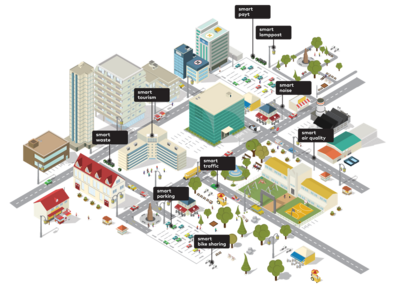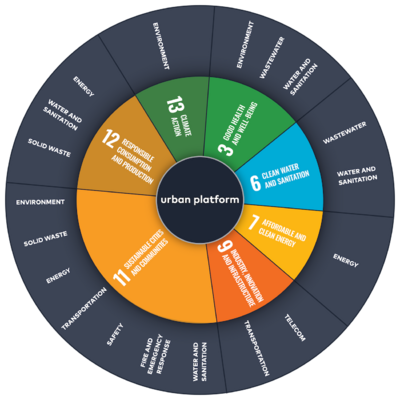Urban Platform: Difference between revisions
No edit summary |
No edit summary |
||
| (7 intermediate revisions by the same user not shown) | |||
| Line 7: | Line 7: | ||
|status=Implemented | |status=Implemented | ||
|sector=Data, Transportation, Utility | |sector=Data, Transportation, Utility | ||
|chapter=Measuring Transportation Performance, Open Source | |||
|summary=An easy-to-use platform that allows you to manage your city, whether you are responsible for traffic and mobility, safety, infrastructure or high-level decision making. | |||
|updated=2022-03-23 | |||
|tag=Open Source | |tag=Open Source | ||
}} | }} | ||
__NOTOC__ | __NOTOC__ | ||
| Line 56: | Line 58: | ||
</div> | </div> | ||
</div> | </div> | ||
{{#ev:youtube|fMkyE_6BSGc}} [[File:map_city.png|400px|City Map]] [[File:sustainable-scheme.png| | {{#ev:youtube|fMkyE_6BSGc|alignment=center}} [[File:map_city.png|400px|City Map]] [[File:sustainable-scheme.png|400px|Sustainable Development Goals]] | ||
Latest revision as of 04:32, March 31, 2023
| Urban Platform | |
 Urban Platform | |
| Team Organizations | UbiWhere Urban.Systems |
| Point of Contact | Ricardo Vitorino Wilfred Pinfold |
| Participating Municipalities | Portland OR |
| Sectors | Data Transportation Utility |
| Initiative | |
| Status | Implemented |
| Last Updated | January 31, 2026 |
Summary
An easy-to-use platform that allows you to manage your city, whether you are responsible for traffic and mobility, safety, infrastructure or high-level decision making.
Use the holistic view of your city to get effective insights based on cross-domain data processed in a unified way. Check every detail in a customizable dashboard, according to your preferences.
The Urban Platform helps the city to meet the Sustainable Development Goals (SDGs) by taking into account the Sustainable Cities and Communities Indicators from ISO 37120 and 37122, among other indicators.
SINGLE INTEGRATED SYSTEM
Centralised collection and processing of data from heterogeneous sources and city systems.
INTEROPERABILITY AND STANDARDISATION
Seamless integration and standardisation of different kinds of protocols and standards.
OCCURRENCES MANAGEMENT
Integrated and customizable workflows for a more efficient and coordinated response to incidents.
SUSTAINABILITY BY DESIGN
Well-defined metrics to help cities benchmark their progress towards the Sustainable Development Goals.
CROSS-DOMAIN DATA ANALYSIS
Correlation of information for knowledge extraction, forecasting, reporting and impact assessment.
REAL-TIME INDICATORS
Dynamic, contextual insights about the city ecosystem to foster smooth operations.

